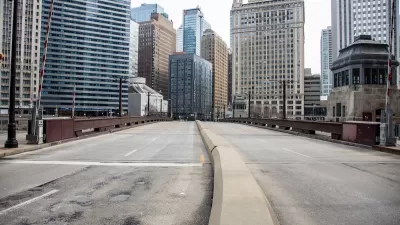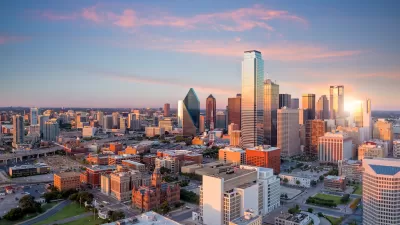A Brookings Institution study reveals that crime rates in major cities have risen, but downtown districts account for a negligible part of the growth.

According to a study from the Brookings Institution, fears about safety in U.S. downtowns are not based in fact. As Jake Blumgart explains in The Philadelphia Inquirer, the authors “ found that across the four cities, downtowns accounted for an almost negligible share of total citywide property and violent crime.”
While violent crime rates are at a high in other parts of Philadelphia, for example, the Center City neighborhood remains safer than others, accounting for only 1 percent of the growth in property crime between 2019 and 2022. Of the four cities in the study, Seattle was the only one with a higher rate of violent and property crimes downtown. In the others, the share of crimes occurring downtown remained the same or, in Philadelphia’s case, went down.
The study notes that a rise in visible homelessness and drug use, driven in part by lower foot traffic and vacant storefronts, influences the overall sense of unease felt by many urban residents, but points out that “people living on the street are more likely to suffer crime than to commit it.”
When it comes to violent crimes in Philadelphia, the study highlights the patterns that existed pre-pandemic. “Those crimes are almost wholly not taking place in Center City, but in systemically disadvantaged neighborhoods where much of the violence took place before the pandemic — and where it’s since become far worse.”
The study outlines recommended solutions that can improve safety, such as lighting and other infrastructure. According to researcher Hanna Love, “The best use of public funds would be investments in safety infrastructure in the higher-crime neighborhoods, rather than, say, adding a bunch more police officers [downtown].”

Manufactured Crisis: Losing the Nation’s Largest Source of Unsubsidized Affordable Housing
Manufactured housing communities have long been an affordable housing option for millions of people living in the U.S., but that affordability is disappearing rapidly. How did we get here?

Americans May Be Stuck — But Why?
Americans are moving a lot less than they once did, and that is a problem. While Yoni Applebaum, in his highly-publicized article Stuck, gets the reasons badly wrong, it's still important to ask: why are we moving so much less than before?

Using Old Oil and Gas Wells for Green Energy Storage
Penn State researchers have found that repurposing abandoned oil and gas wells for geothermal-assisted compressed-air energy storage can boost efficiency, reduce environmental risks, and support clean energy and job transitions.

Six Reasons Why Housing Is a Human Right
Is housing a human right? A law professor shares six reasons why it should be, from its role in protecting other rights to global recognition and U.S. legal traditions. As public support grows, could housing be the next right written into law?

Updating LA’s Tree Rules Could Bring More Shade to Underserved Neighborhoods
A new USC study finds that relaxing Los Angeles’ outdated tree planting guidelines could significantly expand urban tree canopy and reduce shade disparities in lower-income neighborhoods, though infrastructure investments are also needed.

California's Canal Solar Projects Aim to Conserve Resources and Expand Clean Energy
California’s Project Nexus has begun generating electricity from solar panels installed over irrigation canals, with researchers and state agencies exploring statewide expansion to conserve water and boost clean energy production.
Urban Design for Planners 1: Software Tools
This six-course series explores essential urban design concepts using open source software and equips planners with the tools they need to participate fully in the urban design process.
Planning for Universal Design
Learn the tools for implementing Universal Design in planning regulations.
Heyer Gruel & Associates PA
City of Moreno Valley
Institute for Housing and Urban Development Studies (IHS)
City of Grandview
Harvard GSD Executive Education
Salt Lake City
NYU Wagner Graduate School of Public Service
City of Cambridge, Maryland





























